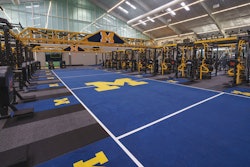The University of Wisconsin football team will not travel to Nebraska to play the Huskers on Saturday after six players and six staff members, including head coach Paul Chryst, tested positive for COVID-19. Meanwhile, questions have been raised as to whether Big Ten Conference COVID policies, regarded as the most stringent in the nation, are being properly applied or are even appropriate to deal with playing football during a pandemic.
As reported by CBS Sports, the Wisconsin-Nebraska game will go down as a "no contest" — meaning it will neither be made up nor considered a forfeit — despite Wisconsin making the call on its own to cancel without consideration for the Big Ten's automatic cancellation thresholds. The dozen individuals in the program who tested positive aren't enough to trigger an automatic cancellation that comes with a COVID-19 positivity rate of at least 5 percent and a population positive rate of at least 7.5 percent in the neighboring area. Short of that, Big Ten protocols state teams can "consider viability of continuing with scheduled competition."
"Anything below that, if local leadership — the president, chancellor, athletic director, medical staff, public health — any of them deem that it's inappropriate to move forward, they work in consultation with us and with opponent," said Big Ten spokesman Kerry Kenny. "No contest is the outcome."
Nebraska fans took to social media, claiming the Cornhuskers should receive a forfeit victory because the Badgers made the decision unilaterally.
However, Big Ten athletic directors voted unanimously last week to allow schools to cancel a game when they deemed positivity rates were too high but fell short of the aforementioned "red/red" threshold that would trigger an automatic shutdown. Wisconsin decided to cancel the Nebraska game and shut down the program for a minimum of seven days.
"We just felt that with the number of positives in that short a timeline, the chancellor and I felt we have an issue that we had to make this decision and get our arms around this virus now before it got out of hand," Wisconsin athletic director Barry Alvarez said.
Infected players will be out 21 days from the date of their original positive antigen test. Coaches will be out a minimum of 10 days.
The 21-day dormant period for players is unique to the Big Ten, and some have questioned the rationale behind it. As reported by Sports Illustrated, the reason the conference mandated its strict return-to-play timeline is because of the breadth of blood tests and heart screenings involved, and the fact that no heart test could be administered until two weeks after an athlete contracted the virus.
In the same week that the 21-day policy ensnared one of the league’s high-profile players, Wisconsin quarterback Graham Mertz, some of the nation’s most acclaimed sports cardiologists published a revealing paper in the Journal of the American Medical Association that may undermine the conference’s return-to-play rule less than two months after its adoption.
The nine-page report, heralded by physicians across the country, indicates that doctors are finding so few heart abnormalities in COVID-positive athletes that they are no longer recommending any cardiac screenings for those who experienced mild symptoms or no symptoms.
Alvarez believes the conference’s medical panel should “reevaluate” the 21-day policy and the intense cardiac screening protocols. He adds that his medical staff has not reported finding many heart abnormalities in UW athletes infected with COVID since the Big Ten’s restart. “If I don’t hear anything, that means there hasn’t been much,” Alvarez told SI.
Choosing to err on the side of caution could prove costly for the league at large.
"The presidents of the Big Ten decided, ‘Okay, if you coaches want to come back, we’re going to put some serious teeth into the protocol.’ You have an immunologist and an epidemiologist who are presidents in the Big Ten. And they put, what I think is, a ridiculous 21-day protocol," commented ESPN's Paul Finebaum, as reported by 247sports.com. “Everyone else in sports, it’s either 10-14 days. That’s the CDC guideline. They offered 21. So you’re playing an eight-game season, plus one at the end of the season with the championship game, and there are no bye weeks, guys. None. A team like Wisconsin, who was a threat to be a divisional champ and play Ohio State in the title game, they’re done now. …The Big Ten got what they wanted. They did this so Ohio State could have a legitimate shot at winning the National Championship, and now they’re paying the piper.”

































